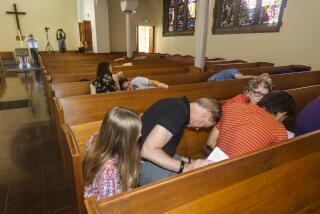Faulty Connections Plague Church’s Try for Telephone Detente
- Share via
Before the telephone linkup that would allow members of a Huntington Beach church to talk to--and see--their counterparts in Moscow, Marnie Weeks told the crowd that they were not there “to solve any political mystery, but just to get to know one another.”
But what Weeks and her husband, Pat Weeks--who jointly operate the pro-peace Human Unity Institute in San Clemente and were producers of Saturday night’s show--did not expect was telephone failure.
The two warmed up the crowd of about 250 people in the small auditorium of the Huntington Beach Church of Religious Science. Music and laughter prevailed as they waited for the linkup to be completed.
But, alas, the telephone system got the best of them and “Spacebridge,” as the program was dubbed, was not quite what the crowd had been promised.
Joel Schatz, president of San Francisco/Moscow Teleport, was coordinating the slow-scan video computers. The process allows participants of the linkups to simultaneously talk to one another while also viewing still photographs on a giant screen. The pictures are “slow-scanned” over the telephone line and appear in a rapid series of still shots.
Americans Could Be Heard
Peggy Bassett, the church’s minister who is currently leading a “citizen diplomat” tour of the Soviet Union, and a crowd of Soviet citizens at the other end of the linkup could hear and see the Americans.
But after two hours of dialing, redialing and coaxing AT&T; operators in Pittsburgh--where calls to the Soviet Union are placed--only a few voices could be heard on the Huntington Beach end of the line.
Schatz, who has conducted about two dozen of these United States-Soviet Union linkups in the last two years, was bewildered at the conclusion of the 20-minute exchange.
“It’s a sheer mystery. There are always glitches because it is an unreliable system, but it has never been this bad,” he said.
Schatz has worked with both the Soviet and American governments to coordinate these slow-scan video hookups. He is to return to Moscow in a few weeks and said that he would petition the communications minister there to work to establish a 24-hour telephone line to connect the two countries.
“It’s fairly astounding that two countries that have so many nuclear warheads don’t have an adequate telephone connection to communicate,” he said.
Convey Messages
Despite the glitches, a few people got to convey messages and best wishes to Soviets at the opposite end of the connection. Katy Greene, an elementary school teacher from Encinitas, was able to talk to Sasha, a Soviet educator.
Greene was one of a handful of American teachers who took 48 schoolchildren on a tour of the Soviet Union last October under the auspices of “Children as Teachers of Peace.” Her son, Jack, 11, was one of the students.
While there, Greene left 200 letters from her class. However, only three have been answered by Soviet children and she feared that the school’s address might have been lost. She used the opportunity to repeat the address for Sasha.
Through an interpreter at the other end, Jack talked to a Soviet boy his age.
“Hi, my name is Jack. I’m a sixth grader and I like soccer and basketball,” Jack said.
The boy at the other end said he wanted to be a physicist.
“Tell him that I hope he becomes a physicist or anything he wants to when he grows up,” Jack told the interpreter.
Greene’s mother, Breeze Bryson Schreiner of Torrance, also asked Sasha to convey personal messages to two friends she met during two previous trips to the Soviet Union.
Sasha, the easiest of the Soviets on the line to understand, also conveyed a peace message for the Americans, perhaps also alluding to the telephone connection problems.
“My hope is that we will build a big computer so that we can communicate with each other every day,” he said. The crowd responded with applause and cheers.
Schatz said he would continue to use the telephone linkup until a better system is developed.
“It’s a good thing for people from both countries to get to know each other. We do it for cultural and educational purposes. I think these projects are of mutual interest to people from both sides,” he said.
Schatz added that the linkup is relatively inexpensive since the only real cost is “the price of a telephone call.” Saturday night’s near miss, he said, probably cost $1,000.
More to Read
Sign up for Essential California
The most important California stories and recommendations in your inbox every morning.
You may occasionally receive promotional content from the Los Angeles Times.










